Here's some stuff you should know about Rachel Nagy before we get down to cases: She curses like a merchant marine on a meth bender. She doesn't mind the occasional bar brawl. She's been known to brag about the excellence of her blowjobs. She can knock back a fifth of vodka for "shits and giggles," but brown liquor makes her a violent, drooling lunatic. She doesn't dig wussy dudes who fall in love and get all sentimental on her. She used to be a butcher, which is to say that she used to cut meat for a living.
Now here's the most important thing you should know about Rachel Nagy. Chick can sing. Her ass off.
She's the frontwoman for The Detroit Cobras, a raucous Motor City band that takes obscure old R&B and rock 'n' roll gems and scuffs 'em up with rude guitars and stompin' garage beats. Kind of like Nuggets meets Stax soul. A lot of bands can rock, but The Detroit Cobras can roll, too.
Nagy, who had never sung in public before joining the Cobras in '94, is neither post-punk caterwauler, pitch-challenged indie rocker nor soul-diva wannabe. She's very much her own beast. For all her jaunty, early-Chrissie-Hynde swagger on fast numbers, she can also bring a beery vulnerability to mid-tempo tunes like Naomi Neville's "It's Raining."
It wasn't until the release of Baby, the Cobras' most recent disc, that Nagy could listen to her own singing without recoiling in horror. "The first time I heard it recorded, I wanted to kill myself," she says, and then lets out one of the throaty laughs that punctuate a candid hour-long conversation. "This record was the very first time I actually sat there mixing it and listened to my voice and didn't cringe."
Such blunt self-effacement might be construed as disingenuous from another rock singer, but Nagy is so bereft of guile that you can't help but buy it.
Maybe it's because being in a touring rock band with a few albums out and a rabid cult following was never — never — part of her plan. She was the slacker chick who "laid on the floor watching The Simpsons" while guitarist Mary Ramirez and a few dudes from the Detroit rock scene cooked up the Detroit Cobras idea. After exhausting a few frontperson options, the band turned to Nagy for no other reason than she was around and knew the tunes. "Finally, they got me drunk enough and I tried it," Nagy says.
From the outset, the core Cobras — Nagy and Ramirez — never set out to do anything other than have fun. With their rep beginning to spread around Detroit, they got an $800 offer to play New York's Village Underground, but passed on the gig — too much hassle. They then quickly got a lesson in supply and demand. Soon, the club's offer increased to $1,500.
The group effectively broke up after a couple years, but Nagy and Ramirez decided to re-form with new members. Since then, the boys in the band have basically been a revolving cast. The resuscitated Cobras "never really wanted world domination," Nagy says. "We weren't gonna do dollar-a-day van tours and live on ramen and suffer for our art. Fuck that. We were not trying to get famous and reach every motherfucker out there."
They've reached more motherfuckers than they ever dreamed of. In certain markets, the Cobras can draw crowds of 800 or more, and then turn them into sweaty, dance-exhausted motherfuckers. Detroit Cobras albums earn critical props, but it's on stage that the band really makes its bones.
Here's another little thing you should know about Rachel Nagy. She has a tattoo (where, I don't know) of "a girl ripping open her chest and there's no heart there," she says. "It says 'no love lost.' I was never one of those girls who falls in love and cries at night. If someone pissed me off, I'd walk. I disengaged myself so quickly that sometimes I wondered what was wrong with me. I used to live vicariously through the songs — 'I'd die without you' — close my eyes and pretend that I was like that."
That changed when she met the cat from San Diego. "It was the first time I fell in love and it was like, 'Oh-my-God, I understand Barry Manilow,'" she says and guffaws. "Well, not that bad. But I was so insanely attracted and the chemistry was so smokin' hot that I had sleepless nights. My head and my heart were at complete odds with each other."
So Rachel left the gritty confines of Motown to join her new beau in postcard-perfect San Diego, actually living on a houseboat where she could gaze over idyllic watery vistas.
Then she woke up. Rachel split with her boyfriend and returned to Detroit. "I wasn't happy [in California]," she says. "I was getting soft. I'm so happy to be back in this scummy, nasty city."
Rachel does have a lasting memento of the relationship, though. It prompted her to select the old Ruby Johnson tune "Weak Spot" for Baby. Her saucy version is one of the album's standout tracks. "The way the song is calm and then rushes in, the words, everything just totally nailed it," she says. "This guy was my weak spot."
That's just one example of the serendipitous ways that The Detroit Cobras choose their material. There's no system, really, just gut instinct. But the method has changed over the years. "We used to go to flea markets and spend hours digging through the dollar bins in the dust and mold and stuff," Nagy explains. "I don't have the time and patience for that anymore. It was the folly and energy of youth. Now we have the glory of people giving us music [on tour], sending us music. We've even been in Europe and had music magazines give us money to go shopping in the best record stores in town. We really have the luxury of being lazy little brats, laying around and opening the mailbox."
Which raises the inevitable question: Why empty the mailbox instead of the muse? On three full-lengths and an EP, the Cobras have included exactly one original tune, a salacious blast of double entendre called "Hot Dog (Watch Me Eat)."
For the final word on why the Cobras don't start writing the bulk of their material, we'll turn to Nagy's partner, Ramirez, who said this to an Internet writer not long ago: "It's a conscious effort not to play bad music. Just because you can write doesn't mean you can sing, and just because you can sing doesn't mean you can write — that's the basis of the whole Cobras thing."


















